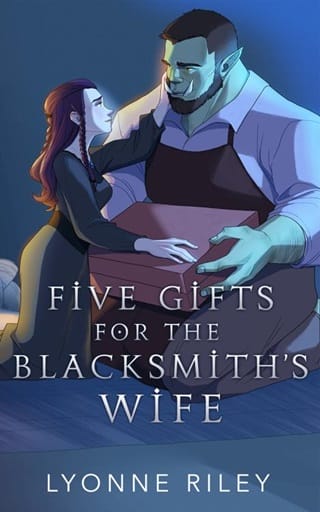Chapter 13
T he Petersons' parlor was as hot as an oven, but Petra's features remained blue-tipped, and her teeth chattered as if the cold had seeped into her bones. Cleo fanned herself with an accordioned newspaper dated Monday, April 8—the last normal day in Norway.
How long before this grew to be normal? It hadn't taken them long in Poland. Mere days until one learned to avert one's gaze, ask no questions, and never ever get involved.
That had worked right up until Micky vanished.
"The dog is brown." Despite Fru Peterson's care, Petra's voice was still colored with smoke and pain, as if her lungs had been singed in the blast, and Cleo had to lean close to catch every word.
" Hunden er brun ," Cleo repeated the phrase in Norwegian.
" Where is the closest train station?"
A little harder. Cleo had to think about it. "Hvor er . . . hvor er . . . n?rmeste . . . togstasjon?"
Petra's lips curved in a sad Madonna smile. "Your pronunciation is horrible, but you're correct. Now here's a tricky one. Man skal ikke skue hunden p? h?rene ."
Cleo rolled the words back and forth in her brain but came up empty. "Something about dogs, but after that I have no idea."
While everything else about her had grown weaker by the hour, Petra's gaze remained keen as steel. It zeroed in on Cleo with unerring accuracy until heat warmed her cheeks. "It is an idiom," she explained. "It means, literally, you shouldn't judge the dog by its hairs."
Was this Petra's roundabout way of apologizing? Now Cleo was worried. Petra didn't look like someone who second-guessed her decisions very often—if ever. "I'll be sure to remember that one."
Acknowledging Cleo's words with the barest of nods, Petra winced, a flicker of pain passing over her face, eyes squeezed shut.
"We've been at this for over an hour. You should rest."
Petra grew quiet and then silent, her eyes fluttering closed. Her skin shone like pearls, great shadows scraping out the flesh under her eyes, hollowing her throat and shoulders. And there was a finality to her gaze that frightened Cleo.
This fear blossomed into a sudden and overwhelming need to feel cold air on her face and wake up from this growing sense of unreality that made breathing hard and thoughts spin like snowflakes. She smoothed the quilts over Petra then fled to the farmyard, ashamed by her cowardice.
The sun reflected off the snow, blinding her as she emerged from the dim, overheated kitchen. She squinted, eyes watering, as she made her way to the shed, where the cows gathered in a jostling, stamping crush at the gate waiting to be fed.
Peterson forked hay over the gate to the herd while one son filled the trough and another dropped fresh straw down from the loft. Both boys were in their teens, square-jawed and earnest like their father, but there was none of the usual banter between siblings, no joking or laughter. They went about their work with a sense of resigned inevitability.
She leaned against the gate, rubbing the broad forehead of the closest cow. Raised in the heart of New York City, she'd never been the accomplished equestrian Aunt Daisy was, but Cleo had always enjoyed the peace of the stable, resulting in more than one flustered nursemaid finding her among the animals when her mother's grief and expectations seemed insurmountable. "Is there anything I can do to help?" She rummaged through her recent lessons. "Help you? Kan jeg hjelpe deg? "
"I speak English." The older boy handed her the pail. "You can get water for the chickens." He pointed toward the pump just as a thud shook the beams of the loft, followed by the angry crack of a curse. "Faen i helvete!"
" Det er nok! " Peterson shouted. "That's enough!" He addressed Cleo with an apologetic shrug of his shoulders. "Forgive my sons for their disrespect. They are desperate to join their friends who have already left to fight. But I need them here, and their mother would be heartbroken."
Her father hadn't been much older than these boys when he exchanged his new marriage for short-lived glory in the skies over France. The junior Petersons, at least, had the excuse that it was their country being overrun. What was her father's reason? Did he care that Mother's heart would break? That his child would never know him as anything other than a portrait on a wall? A name held over her as a threat? A ghost she could never live up to, but could never shake?
Cleo filled the pail with icy water before lugging it across to a pen, where a few hens scraped at the mud while a handsome rooster presided from the door of a coop. One of the younger Peterson children gathered eggs into a basket.
"Frokken Jaffray! Come! Quickly!" It was Fru Peterson. She flapped her apron like one of her flustered hens.
Cleo dropped her pail and raced for the house.
Petra was sitting up, her face gone from gray to a horrible shade of bruised and dingy purple. She clutched a copy of an Edith Wharton novel to her chest, her eyes wide and terrified as she fought to catch her breath. Pain was now clear in every brittle movement. "We have to find Madam Minister," she gasped. "This very minute."
Before Cleo could answer or even step farther into the room, Petra gave a strangled sob and collapsed, the book falling to the floor in a spill of pages.
"I t is my fault," Petra moaned, her words slurred and thick as if she'd been drinking. "All my fault." She'd been unconscious only for a few minutes, before coming around in a shuddering convulsion of limbs as if fighting to pull back from an invisible brink.
"Easy now." Cleo pressed a cool compress to her forehead. It was all she could think to do, though it seemed completely inadequate to the situation. Like a sticking plaster for a severed limb. "What's all your fault?"
Petra craned her neck from side to side as if checking they were alone, her hands picking at the blankets, her hair, her skin. At last, she pointed to the novel, which sat on the floor at the end of the couch. "It was in my coat pocket."
"What's so important about a copy of The Buccaneers ?"
"It's not. It's"—she dropped her voice to a whisper—"a State Department codebook. Mrs. Harriman was ordered to guard it with her life, and now it is here—with me." She started shaking again, her jaw clenched so hard, Cleo imagined she could hear teeth cracking under the strain. "It's my fault."
"It'll be all right, Petra. Honest." Cleo hurried to reassure her before Petra's anxiety grew dangerous. Her face was sunken as if being sucked dry by some unseen force, the bones of her skull clear beneath her blue-gray skin. "When we get to Stockholm, we'll turn it in at the legation. No harm done. Just lie back. Take a deep breath. I'll make sure the codebook is returned. Nobody will ever know it was missing. I swear it."
"The word of a grasshopper?" Petra asked with a hint of her old scorn, though the sting was gone.
"We grasshoppers might be flighty, but we're tenacious. Just ask the Egyptians."
Petra smiled. "Not even death stops the jokes."
"Death is the biggest joke of all," Cleo answered simply.
Petra relaxed back into the blankets, eyes closed, and Cleo slipped away to confer with Fru Peterson. She might not be able to make Petra better, but she could make her smile and that would have to be enough.
When Petra woke next, Cleo was waiting with a bowl and spoon. "More soup?"
"Better than soup," Cleo replied. "Taste it."
Petra's face broke into a smile and for a moment a blush of pink colored her gray cheeks. "Cloudberry jam."
"It's store bought, but it's the best I could do in a pinch."
After a few bites, she laid back, her voice drifting. "I guess you bring joy, after all." Cleo thought she'd fallen asleep, but it was only a respite as she regathered her strength. "When I was little, my great-grandmother died." Petra paused, her breathing wet and raspy. "I remember sitting under a table listening as the grown-ups laughed and told stories about her, the sillier the better." Her words came slow and barely audible over the frightened pounding of Cleo's heart. "They all left with smiles on their faces. I didn't understand how they could be happy when I was so sad."
"My mother told me stories about my father," Cleo said. "In all of them, he was this amazing hero that everyone admired. I started out sad, wishing I knew him so I could tell stories about him too. Later I realized nobody could be that perfect. And I stopped being sad. And I stopped listening to the stories—and my mother."
"You sound like my sister, Sofia. She never listened either. If someone told her to go left, she'd go right just to spite them."
"Where is she now?"
"I wish I knew. She left the hospital where she worked to become a medic for the military."
Cleo took a bite of the jam left in the bowl. It was tart and tingled on her tongue, but there was a grassiness to the aftertaste, a wild flavor she'd never tasted before.
"Will you tell stories about me when I am gone?" Petra asked.
Fear skittered over Cleo's skin like ice. Dread clamped a fist on her shoulders, lead sat in her belly. She dropped the spoon back in the bowl, the jam turning bitter on her tongue. "I won't need to. You'll be there to tell your own story."
Petra fell silent. Her fidgeting ceased. "I do not think I will leave this place."
"Don't be ridiculous." Cleo's panic rose into her chest, up her throat, itching at her scalp, cold and slick. She wanted to run, but her legs wouldn't hold her. "Peterson said the roads are open. We can get you to the hospital in Elverum."
Petra put her hand over Cleo's, willing her to stop speaking. She turned her head to the pillow, and the coming darkness caught in the folds of the drawn curtains. "I'd rather stay here." Her voice was no louder than a sigh, but it seemed to echo in Cleo's head. "This place feels like home."
An hour later, Fru Peterson came in, laundry basket on her hip. "He's putting petrol in the truck now. We'll have her to the hospital in no time."
Cleo's eyes burned, her cheeks wet with tears. "She won't be needing the hospital. "
Dear Anne,
We've crossed the border into Sweden. At last, a real bed and a bathtub of my very own. I'd love nothing better than to wallow in hot water before collapsing into dreamless slumber, but duty calls, and by now, I'm sure Washington is wondering if I'm still alive...
T hey left behind the well-armed Swedish troops gathering at the border, their artillery and armored transports holding a tenuous battle line that until a few days ago seemed safe, a backwater that barely needed guarding much less defending. As they bowled through the dark countryside between walls of deep snow, the engine lulled Daisy into a semi-doze where her dreams were filled with the roar of airplane engines and the sing of falling bombs. She jolted awake, stretching to relieve the tension cramping her muscles, the guilt and fear pinching at her chest.
Petra and Cleo would be safe. Of course they would. Safe and well under the care of the kindhearted Petersons. She must remain optimistic. Dwelling on what she couldn't change would only sap her energy for what she could.
She breathed slowly and evenly, focusing on the conversation from the front seat, where Lieutenant Bayard acted as navigator for Mr. Whitney, the two of them speaking quietly about crossroads, turnings, and the safest route up the mountain to S?len and the hotel recommended by an officious border agent with a thin mustache and a high reedy voice that had made Daisy's head ache.
It was only when they pulled up in front of the handsome H?gfj?llshotell resort that the dark fears she'd carried with her since Elverum faded under the bright lights spilling out from the hotel's windows to illuminate the wide treeless slopes. If she hadn't spent the last days dodging German bombs, she might have almost believed she was here on a skiing holiday, her cases filled with thick woolen sweaters and stout walking boots rather than the confusion of papers and files and ledgers stuffed into the trunk and piled along the floor under her feet.
As they pulled into the parking lot, the Ford's headlights picked out a man leaning in a doorway smoking a cigarette. Two others hovered in conversation by an enormous sedan, its engine plinking as it cooled. A third group exchanged information like plotters at a coup. Hounds catching a scent, all of them stood straighter, eyes focused on the car and its ragged American flag as it crunched to a stop on the frozen snow.
"Looks like the press got here ahead of us," Mr. Whitney mumbled before stepping out of the car as a hotel porter hurried over to collect the luggage. "Damn parasites."
Once Daisy might have felt unsure facing a phalanx of eager reporters, afraid of speaking out of turn or stepping on diplomatic toes, but the last few years had supplied her with a steady faith in her abilities. She'd come to enjoy the journalists and broadcasters who'd attended her dinners in Oslo—their clever conversation, their honest unfiltered opinions, their insight into global politics usually as prescient as any State Department official. They were a good source of information and, in many cases, a good source of fun.
"We all have our jobs to do," she said, climbing creakily to her feet before turning on her well-rehearsed minister's persona like a flashlight against the gloom. "The trick is to learn more from them than they learn from us."
The reporters started forward, but before they could get a word out, Bayard stepped in front of Daisy with an arm extended like a Princeton running back. "A few minutes before the inquisition, fellas. It's been a long three days."
They fell back, but Daisy could sense their curiosity and their eagerness. What had she seen? What did she know? What might she let slip that their readers and listeners could gobble up with their cornflakes and coffee? She'd be happy to indulge them, but right now she wanted a bath, a bite to eat, and a bed—in that order.
The hotel was crowded, the usual wealthy guests and Swedish nobility exchanged for displaced diplomats and government officials from half a dozen countries. There were hugs and shouts of greeting and relief every time the doors swung open. Britain's Sir Cecil Dormer and his wife, Lady Mary, were safely ensconced in the lobby bar; Poland's minister to Norway, Mr. Neumann, passed Daisy at the elevator; and the irrepressible French foreign minister's wife, Madame de Dampierre, had commandeered a radio in one of the lounges and was practically leaning an ear to the speaker in her search for the latest news.
"Mrs. Harriman?" Lieutenant Bayard caught her in the upstairs corridor, already fitting her key into the lock. "The switchboard has the legation in Stockholm on the line. The ambassador is anxious to speak with you. There's a secure line in the hotel manager's office."
She shoved the key into her coat pocket, bidding a regretful farewell to any chance of a rest.
On the phone, Freddie Sterling breathed a huge sigh of relief. "We've been worried sick, Daisy. Three days and not a peep out of you."
"I've been rather preoccupied trying not to be blown to smithereens. Speaking of which, any word on His Majesty and the crown prince? Are they safe?"
"Our guess is as good as yours. The Norwegians aren't talking, which makes sense when they can't be sure who else might be listening. But we've heard the crown princess and her family are safe in Sweden—for now."
Safe and staying in the same hotel, according to a harried front desk clerk who imparted the information at the same time he apologized to Daisy for the overtaxed plumbing system and arranged for supper to be sent up to her room. Sterling satisfied for the minute, Daisy started once more for the elevator. This time she was interrupted by a shout and a hand on her sleeve.
"Mrs. Harriman, Arthur Menken of the United Press." He flashed his press card before maneuvering her toward the bar with the prowess of a lion singling out a wounded gazelle. "A word if you don't mind..."
Another gentleman, this one thirtyish with knife-edged cheekbones and dripping in cologne, joined them before Menken could move in for the kill. "We've heard rumors of your amazing journey," he flattered in rapid-fire French, "and would love to interview you for Paris Soir ."
Exhaustion dogged Daisy, but there was also a restlessness after her conversation with the US ambassador to Sweden. A need to be doing something, moving forward, making plans. It took her like that sometimes, this odd eagerness. Her late husband, Bordie, had often witnessed her single-mindedness, and while he might not have always understood it, he didn't stand in her way when the feeling took hold.
"Gentlemen, I'm flattered at the attention and would certainly welcome a drink if you're offering." From the edge of the crowd, Lieutenant Bayard cut toward them, his shoulders squared as his jaw. She held him off with a look as she settled herself between the two reporters, a finger of whiskey materializing like magic in front of her. She raised the glass to her lips with a cool smile. "I'll be happy to answer all your questions, but first I have some questions for you ."
Daisy allowed them an hour of her time before pushing back her chair. "And there you have it, gentlemen. I expect you have deadlines to make. And I have a bed calling my name. I'm sure I'll see you in the morning."
They rose when she did, seeing her off with murmured acknowledgments, but she knew as soon as her back was turned they'd be scrambling for the phones, shouting down the miles in hopes of being the first to scoop the world. Lieutenant Bayard escorted her to her room like some sort of unofficial bodyguard. Kind, but hardly necessary. He hovered as she slid the key into her lock, pushed open the door, and switched on the lamp. There was a manner to his presence as if he wanted to speak but couldn't find the words. He didn't need to. She felt the same, but sharing their worry wouldn't ease it, and she'd not seen a real bed in days. There would be time for confidences tomorrow.
"Sleep well, Lieutenant." A wish? A command? He nodded as she closed the door, immediately feeling the slump in her shoulders slide into her waist and down into her ankles.
The duvet was thick as frosting on a cake and there were four snowy white pillows. The radiator creaked with sauna heat and the room's carpeting was thick enough to dig her toes into as she peeled herself out of her clothes and sponged off in the sink while she waited for the bath to fill. Her cases had been brought up earlier and were now lined up neatly in a row under the window. It was only as she rummaged through her overnight case for her cold cream that her heart slid up into her throat. Where was the codebook?
She sank onto the bed, her belly in knots, trying to recall when she'd seen it last. Petra had been using it at the guesthouse. Daisy remembered distinctly seeing it on the table beside her just before the air attack that sent them running into the yard. Had she seen it since? She squeezed her eyes shut in hopes of jogging some flash of memory. She paced the room, retracing each step and each minute over the last frantic days, but it was useless.
The case was here.
The codebook was not.
 Fullepub
Fullepub 



